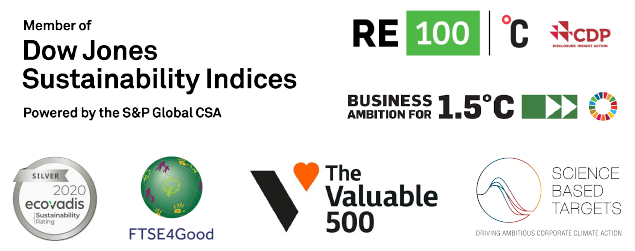Sustainability & ESG
Sustainability: Dentsu Group and society
“The Dentsu Group exists to realize a better society by contributing to the growth of our clients, partners, people, and all consumers.”
Toshihiro Yamamoto
Representative Director, President & CEO
Society is facing some of its greatest challenges. Climate change, biodiversity, and inequality are causing exponential disruption. COVID-19 has exposed the fragilities in our global economic system and highlighted the interconnected nature of our borderless world. More and more the role, contribution, and impact of business in society are under the microscope. Investors, governments, and citizens now expect business to deliver social value through their actions and their products. Over the next decade, companies will need to align purpose, strategy, and action with long-term value creation for society to motivate their people and thrive commercially as a sustainable business. This is now essential for organizations looking to maintain their social license to operate.
Dentsu Group is no exception. For 120 years, we have acted as a bridge between business, society, and consumers. We understand the ability we have to transform business models and influence the way that people think, feel, and act. By positioning social value creation at the heart of our business strategy, not only will we be able to better serve our clients and guide them through this disruption, but we can achieve sustainable business growth for another 100 years to come.
This philosophy is at the heart of Dentsu Group Medium-term Management Plan which includes four goals for the business, one of which is a focus on “Social Impact and ESG (Environment, Society, and Governance).” To ensure this goal is prioritized and remains at the heart of our strategy and plan, we have established new governance at the most senior levels of our business, including the creation of a “Sustainable Business Board” dedicated to integrating sustainability at the heart of our growth strategy, culture, and operations. Chaired by Wendy Clark, Global CEO, Dentsu International Limited, the Sustainable Business Board’s mission is to create a sustainable and profitable business model, delivering shared value for Dentsu Group and society.
The Sustainable Business Board will oversee the implementation of the “2030 Sustainability Strategy” with a focus on three core ambitions: creating a Sustainable World, Fair and Open Society, and using Digital for Good. These ambitions represent areas where Dentsu Group is uniquely positioned to add value, based on our culture, capabilities, and global ecosystem of clients and partners. Our expertise will help guide our clients through disruption and support them to transform their business models through sustainable business solutions.
To achieve these goals, we recognize the importance of embedding sustainability at the heart of our culture. The Sustainable Business Board is committed to ensuring that all 64,000 employees understand the importance of Dentsu Group’s role in society, that sustainability is the lens through which we do business and are inspired to realize our social purpose “To go beyond the here and now to create truly sustainable value for the lasting good of everyone.”
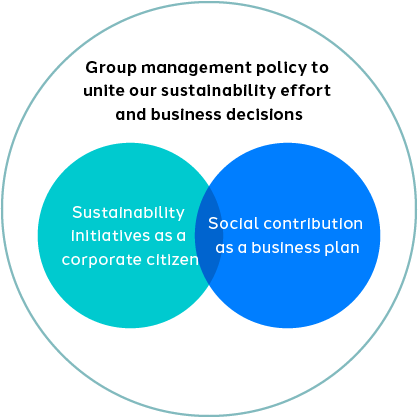
Our priorities
In January, we launched our “2030 Sustainability Strategy” for Dentsu Group. The strategy centres on three priority themes where we believe we can make a material difference to society and the environment.
Sustainable world:
Business as usual is no longer enough, best-in-class environmental performance is now a license to operate. We will accelerate the transition to a low carbon future and reduce the impact of climate change by becoming a Net Zero emissions business by 2030. But the radical decarbonisation of our business and value chain is only the first step. We also recognize that as a digital communications and marketing network, the biggest impact we have is in our ability to change mindsets and influence behaviors. We can raise awareness and inspire people to take action to combat the climate crisis and to live more sustainable lifestyles. Over the next decade, we are committed to helping 1 billion people make better, more sustainable choices.
Fair and open society:
Opportunity and equality are a basic right, not a privilege, yet inequality continues to plague our global society. As a business, our strength lies in difference. We pledge to seek out diverse perspectives, celebrate difference, and build an inclusive culture where everyone is empowered to bring their authentic self to work. We are also committed to ensuring we offer equity of opportunity to people who face additional challenges or inequality, and we collaborate with partners to do the same. In 2021, we are investing in our people and leaders through purpose-built education and training centred around “Inspiring Inclusion,” understanding our gender balance, setting ambitious goals, and putting in place clear paths to promotion for female talent. And while we are committed to creating opportunity for those who need it most, our role in driving change also lies in our ability to raise awareness and promote equality by spotlighting systemic inequality, including fair and equal access to education, healthcare, employment, and legal aid. We can open people’s eyes, create empathy, and challenge perceptions, helping to push boundaries and confront the difficult realities facing society today. For example, our “16 Days of Light Campaign” in South Africa sought to tackle normalized attitudes towards gender-based violence by literally shining a light on the darkest corners of South Africa, the locations of femicides. We drove action by asking people to pledge their support and encouraged women to seek help, with astonishing results reaching over 40 million people. By 2030, we aim to reach 1 billion people with campaigns that challenge perceptions and stereotypes.
Digital for good:
We believe digital inclusion is a basic human right and that having the skills and tools to control your own data builds trust and underpins digital wellbeing. However, our Dentsu Consumer Vision research found that seven out of 10 consumers worry that by 2030, they will have less control over their data, and today almost a quarter of consumers globally remain unwilling to share personal information under any circumstance. We are committed to closing the digital divide and helping digital realize its potential for good. Over the next decade, we will develop people’s understanding of the evolving digital landscape and create change for the better, going beyond inclusion to digital wellbeing. We will help people learn about data ownership, introduce more ethical data policies and practices for our entire value chain, and equip 100,000 young people with the skills and tools they need to feel in control of their digital lives. This includes collaborating with a diverse range of stakeholders to bring transparency, balance, and integrity to the industry, maximizing the positive role digital can play.
TOPIC
WBCSD membership
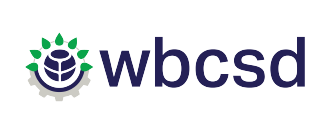
Driving long-term, sustainable change across a highly complex and interconnected world is not without its challenges. No problem exists in isolation, and incremental change is no longer sufficient to fix the world’s most pressing challenges. The World Business Council for Sustainable Development (WBCSD) is a CEO-led organization of over 200 forward-thinking companies working in partnership to accelerate the transition to a sustainable world. Members come from all business sectors and major economies representing a combined revenue of more than US$8.5 trillion. Dentsu Group became a member of the Council in 2021 under the direction of Hiroshi Igarashi, President and CEO of Dentsu Japan Network and Wendy Clark, Global CEO of Dentsu International. Our collective vision is “To create a world where more than nine billion people are all living well and within the boundaries of our planet, by 2050.”
More information on WBCSD here:https://www.wbcsd.org/
2020 Highlights
Climate action
In 2020, we continued to deliver best-in-class environmental performance, reducing our overall Scope 1 and 2 carbon emissions by 56.9% since 2015 and procuring 100% renewable energy across our international operations, exceeding our interim 2020 environmental goals.* We achieved an A- in CDP, outperforming our sector and have been listed in the Dow Jones Sustainability Index for the fifth consecutive year since 2016 as well as in the FTSE4Good. We also achieved Silver status in EcoVadis. In July, Dentsu International signed the Business Ambition for 1.5 degrees and committed to achieving Net Zero emissions by 2030, underpinned by a new and approved Science Based Target at 1.5 degrees. In 2020, we cut the total Scope 1 and 2 emissions by 20.6% this year to 26,955 tonnes of CO2, while the Scope 3 results were 23,066 tonnes. We support the Task Force for Climaterelated Financial Disclosures and are currently in preparation for Group-wide disclosures according to its recommendations. For more detailed environment performance data, please refer to the ESG Data Summary.
* For a company to be RE100 compliant, it is required to purchase the energy from the same country in which it is used. For nine markets (Russia, Taiwan, Singapore, New Zealand, Hong Kong, Kenya, Sri Lanka, Ghana and Argentina) accounting for 9.7% of Dentsu International’s electricity demand, factors beyond Dentsu International’s control have prevented adherence with RE100’s guidelines to source renewables within the countries’ borders. The company has shown ambition by purchasing renewable energy certificates (RECs) from adjacent countries where possible. RE100 supports this approach as an interim measure while the coalition works to improve supply in these markets. For the purposes of reporting and in line with RE100 guidance, the European Economic Area is considered a single market.
Building a diverse and inclusive workforce
Building a diverse and inclusive workforce remains a priority for Dentsu Group. In 2020, we saw the appointment of Wendy Clark as Global CEO to Dentsu international and saw an increase in the number of women in senior leadership positions in the international business to 35%. In Dentsu Japan Network, the number is 12%. Today 14% of senior leaders across Dentsu Group are women. We joined the Valuable 500 to support disability in the workplace, became a signatory to the United Nations Women’s Empowerment Principles and co-founded the “Partnering for Racial Justice in Business initiative” announced at the World Economic Forum in January 2021.
Promoting equality
In April 2020, we rapidly digitised our global social impact programmes including Female Foundry, launching in the United States for the first time and helping to reach our goal of supporting 100 female founded businesses. Female Foundry has now launched in eight countries (Canada, Chile, India, Mexico, Russia, Singapore, South Africa, and the United States). We continued our collaboration with #SeeHer, including developing a gender equality index to help members identify unconscious bias, which was provided to the industry as an open source. It has become the global industry standard for measuring gender bias in ads and programming.
We continue to use the power of media and advertising to drive delivery of the United Nations Sustainable Development Goals and in particular, SDG3, Health and Wellbeing. In April, on World Malaria Day, we launched a new brand, “Zero Malaria” to unite the global malaria community. Our work to end malaria within a generation remains critical with the World Health Organization expecting cases to increase by 50% in 2021 due to COVID-19. We also joined forces with the Association of National Advertisers in the United States to raise awareness of the importance of the COVID vaccine.
Digital rights
We took proactive action to reduce misinformation and eliminate hateful and harmful content online through strategic partnerships, including the Global Alliance Responsible Media, Conscious Advertising Network, and Responsible Media Forum. To support and empower the next generation during “Lockdown,” we took our award-winning schools programme “The Code” online, equipping young people with the digital and creative skills they need to thrive in a virtual world. The Code is now live in nine countries including the United Kingdom and United States and will launch in India in 2021. To date we have reached more than 14,000 young people through The Code.
dentsu Sustainable Business Solutions (dSBS)
Dentsu Group’s capabilities in data, creativity, human centric design, and digital mean we are ideally placed to guide and support organizations through disruption. In dentsu Sustainable Business Solutions, we combine these capabilities with rich insights into human behavior change to meet client demand for integrated solutions that deliver growth and measurable social and environmental impact. Through radical collaboration with our clients and partners, we can help clients and sectors transform to restorative and sustainable business models.
Materiality and/or vision
In 2020, we conducted research into the material risks and opportunities facing Dentsu Group. The process included interviews with investors, clients, activists, and over 300 dentsu colleagues from all over the world. We also leveraged expert insight from the World Economic Forum global risk register, research from the World Business Council for Sustainable Development, the Responsible Media Forum, and the Group’s own thought leadership, including our Digital Society Index and Consumer Vision. Five key themes dominated our research: Climate Change, Sustainable Consumption, Diversity and Inclusion, Reducing Inequality, and Trust—a particular issue for our sector related to issues of digital wellbeing, responsible content, data privacy, and data ethics.
One key theme was universal amongst our stakeholders—the unique ability of the Group to change mindsets and behavior. This insight and the five material themes sit at the heart of our new strategy and vision “We will inspire people everywhere to a new way of living.” And we will do this in three ways: by building a sustainable world, fair and open society, and ensuring digital fulfils its potential for good.
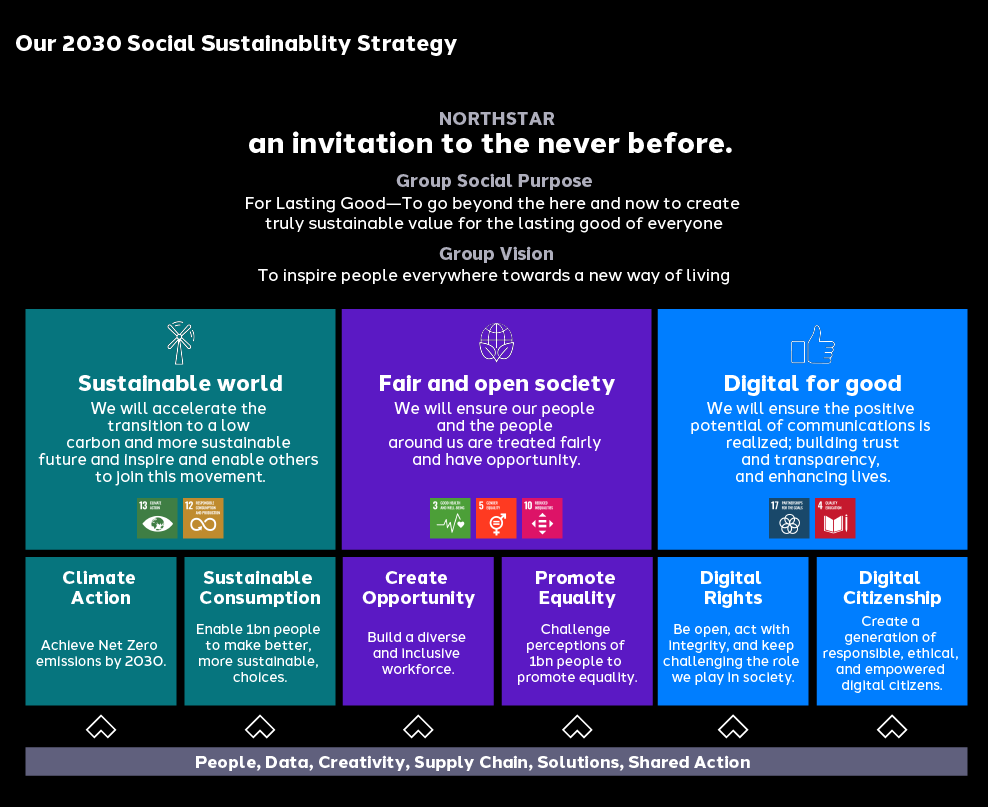
Sustainable Business Board members
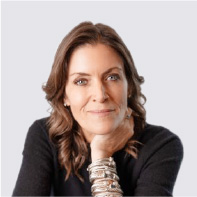
Wendy Clark
Director and Executive Officer, Dentsu Group Inc.
Global CEO, Dentsu International Limited
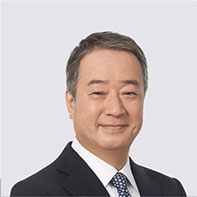
Hiroshi Igarashi
Director and Executive Officer, Dentsu Group Inc.
President & CEO, Dentsu Japan Network
Representative Director, President & CEO, Dentsu Inc.
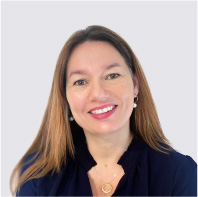
Anna Lungley
Chief Sustainability Officer, Dentsu International Limited
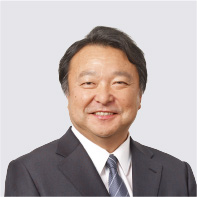
Toshihiro Yamamoto
Representative Director, President & CEO, Dentsu Group Inc.
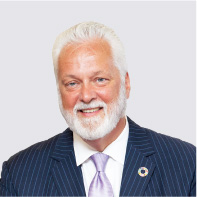
Tim Andree
Representative Director and Executive Vice President, Dentsu Group Inc.
Executive Chairman, Dentsu International Limited
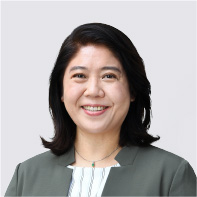
Kuniko Obinata
Director, Diversity & Inclusion Center, Dentsu Public Relations Inc.
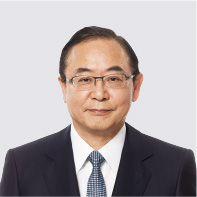
Shun Sakurai
Representative Director and Executive Vice President, Dentsu Group Inc.
Dentsu Team SDGs

Dentsu Japan Network organizes the Dentsu Team SDGs, a Group-wide body that conducts the Consumer Survey on the Sustainable Development Goals (SDGs) in Japan and promotes initiatives aimed at realizing a sustainable society through various educational activities and client company support.

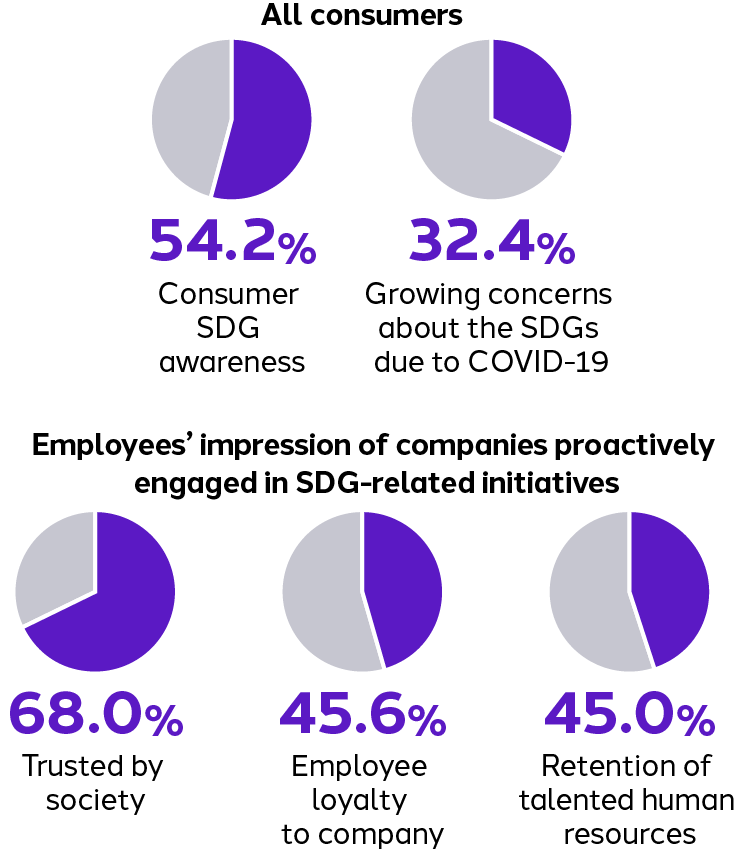
(Survey conducted in January 2021) https://www.dentsu.co.jp/en/news/release/2021/0426-010368.html
Assessment from outside institutions
Each year since 2016, Dentsu Group has been selected for inclusion in the Dow Jones Sustainability Asia Pacific Index for the five consecutive years. We have also been highly rated by the CDP and EcoVadis, and included in indexes such as the FTSE4Good Index Series.
